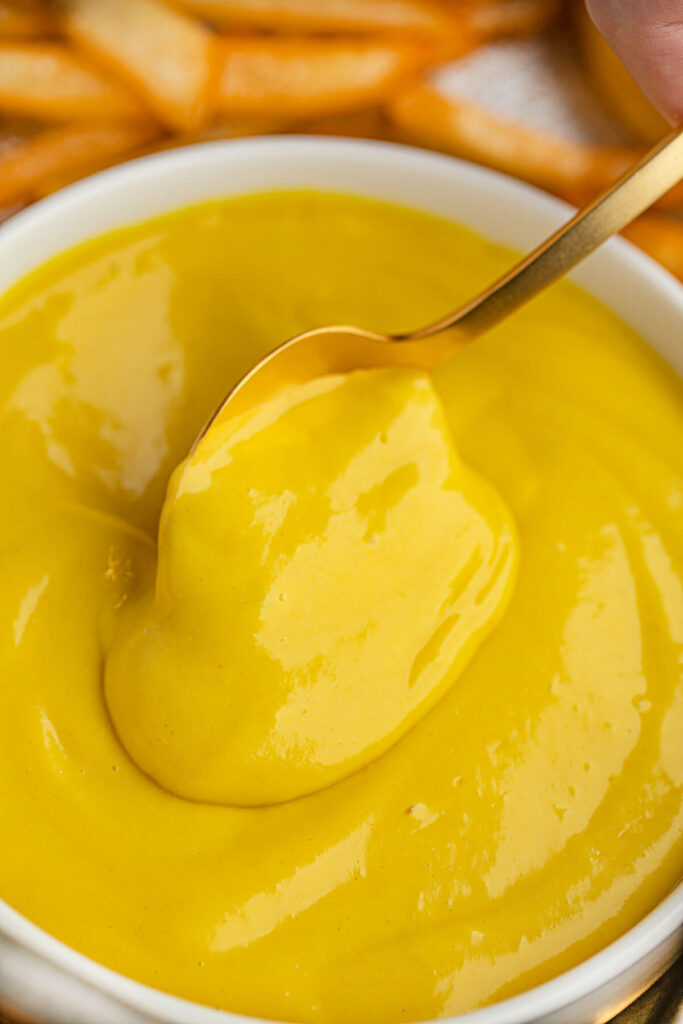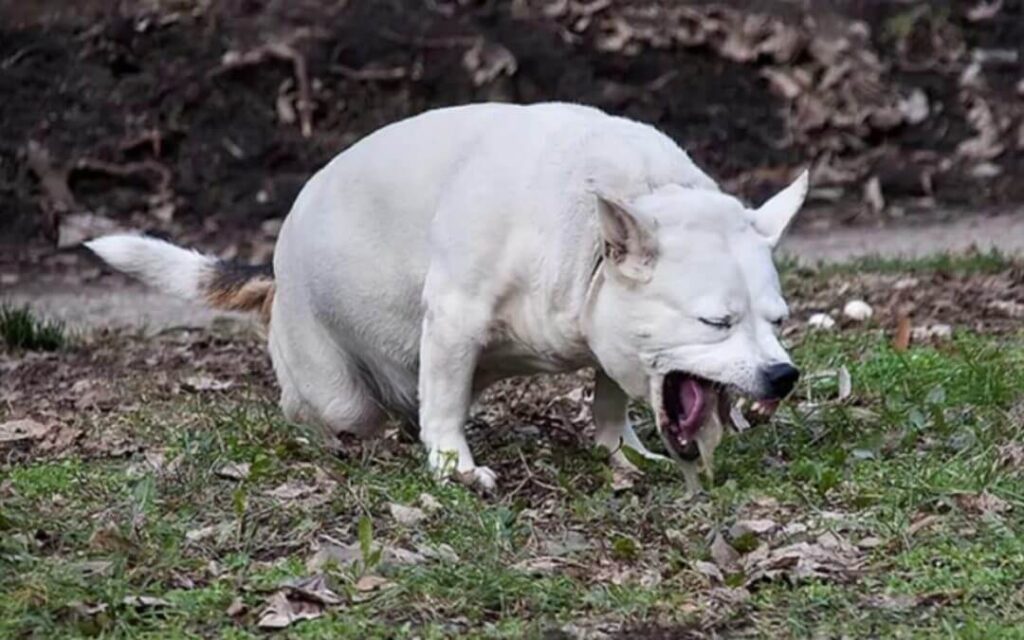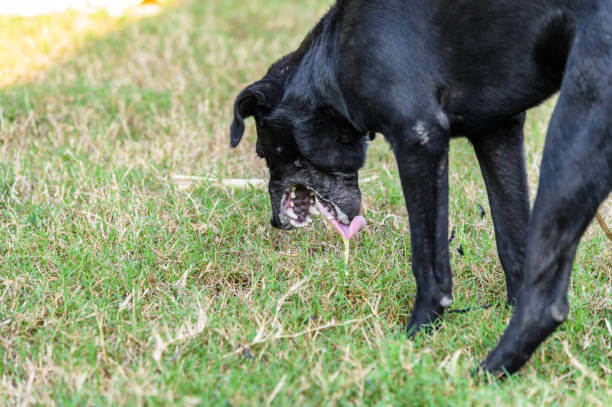Many dog owners have experienced the stomach-churning moment when their pet gobbles up something they shouldn’t have.
In such an incident, you want to act fast to avoid serious damage to your dog’s health.
And inducing vomiting may just be the solution.
If you can get your dog to vomit moments after ingesting something bad, you won’t have to worry about the harmful effects to his digestive system.
Like most mammals, dogs have a gag reflex that helps expel unwanted substances from the body.
But your doggy’s gag reflex is a little bit different from that of humans. This means that you wouldn’t induce vomiting like you would for yourself.
If you were to take your furry friend to the vet, they would most likely use a syringe or even stick a finger down your dog’s throat to stimulate the dog’s gag reflex.
But this approach is dangerous for both you and the dog and should only be done by professionals who know what they are doing.
If you try to use your finger like the vet does, the dog might respond by biting you as a defense mechanism.
So, how can you safely make your dog vomit at home?
Well, that is where mustard comes in handy.
See, mustard contains glucosinolates and isothiocyanate, which are known to have emetic (vomiting) effects.
Here are some steps to follow when using mustard to help your dog puke.
How to Make A Dog Vomit With Mustard

To induce vomiting in a dog, you will first need to gather a few supplies.
This includes a small bowl or container, some mustard, and the appropriate amount of warm water.
Next, you will need to place your dog in a quiet and calm area where he can be easily monitored.
You may wish to gently restrain your dog by holding him with one arm, or by placing him on a table or counter.
Once your dog is in position, you can proceed with inducing vomiting by mixing the mustard or other with the warm water and slowly pouring this mixture into your dog’s mouth.
Note that this mixture should be given very slowly and in small amounts no more than once every five minutes.
Alternatively, you can mix the mustard in your dog’s favorite meal if mixing it in water doesn’t work for you.
The emetic effects of the mustard should kick in pretty quickly after consumption.
Keep in mind that the goal of inducing vomiting is to remove any toxins or unwanted objects from your dog’s system, and should not be used as a way to get rid of excess food or other substances that have been ingested recently.
Be sure not to overdo the mustard though because too much of it may be toxic to your dog.
In fact, the reason why mustard helps the dog to throw up is the fact that the toxic substances are what stimulate the gag reflex.
This is why you should get in touch with a vet if your dog accidentally consumes too much mustard.
Once you have administered the mustard, the dog should throw up in a couple of minutes.
You may want to hold your dog and help him vomit in the bowl to avoid creating a mess.
Spreading a blanket on the floor may also help.
If the dog doesn’t vomit in a couple of minutes, it may be wise to call your veterinarian or an emergency animal hospital for further guidance.
You may also want to check: How to Make A Dog Vomit With Baking Soda
Is It Okay To Induce Vomiting In Dogs?

It will depend on the reason you have for inducing as well as the condition of your dog.
According to the AKC, you shouldn’t even consider inducing a dog that is comatose or lethargic or one that is having seizures.
This is because your dog may have some serious underlying health condition, and inducing vomiting could even make it worse.
If more than six hours have elapsed since they consumed what you are trying to get out, then you are too late to induce vomiting.
Your best cause of action in such a scenario is to take your dog to the vet immediately.
In addition, you shouldn’t induce vomiting in dogs that have ingested corrosive or caustic substances such as drain cleaners or battery acid.
This is because such substances will do more harm to your dog’s digestive tract if they are brought up.
That said, it is often safe to induce vomiting if your dog has consumed something that may harm him—like a small toy that could get lodged in his throat or a non-toxic but poisonous substance.
If your dog has ingested something and hasn’t shown any signs of distress yet, inducing vomiting can help expel the harmful substance before it causes him harm.
So, if you notice that your dog has consumed something potentially dangerous, you may want to induce vomiting as a precautionary measure.
However, do not take it as a treatment but rather as a first aid procedure.
Once your dog vomits, continue observing them to see if there are any signs of sickness and get professional help if necessary.
Related:
How to Make a Dog Throw Up With Hands
I Gave My Dog Hydrogen Peroxide And He Didn’t Vomit: What Does It Mean?
Will Mustard Make My Dog Sick?
Mustard contains large amounts of sodium and vinegar, both of which can cause gastrointestinal distress in dogs.
It can irritate a dog’s throat and nose, as well as cause gastrointestinal distress.
In some cases, it may even lead to vomiting or diarrhea.
How long it takes for your dog to get sick after consuming mustard depends on the size of the dog and the amount of mustard consumed.
A small dog can start to experience symptoms within minutes, while a large dog may not become sick for several hours.
If your dog has eaten mustard, watch out for signs of vomiting, diarrhea, and excessive drooling.
If you see any of these signs, contact your veterinarian immediately.
Also, to prevent any issues with mustard consumption, it is best to avoid feeding your dog foods or treats that contain this spice.
Instead, opt for safe and healthy alternatives like plainly cooked meat or a high-quality dog food formula.
Closing Thoughts
Mustard is a double-edged sword: on one hand, it is toxic and should be kept away from dogs. On the other hand, it can be useful if your doggie eats something harmful and you need to induce vomiting.
As long as you use it in small amounts and just for purpose of inducing vomiting, it should not cause harm to your dog.
However, always be sure to consult a veterinarian if you have any concerns about your dog’s health.
And remember to always keep your dog away from foods and treats that contain mustard to prevent any issues from occurring.
As an Amazon Associate, we may receive a small commission from qualifying purchases but at no extra cost to you. Learn more. Amazon and the Amazon logo are trademarks of Amazon.com, Inc, or its affiliates.

